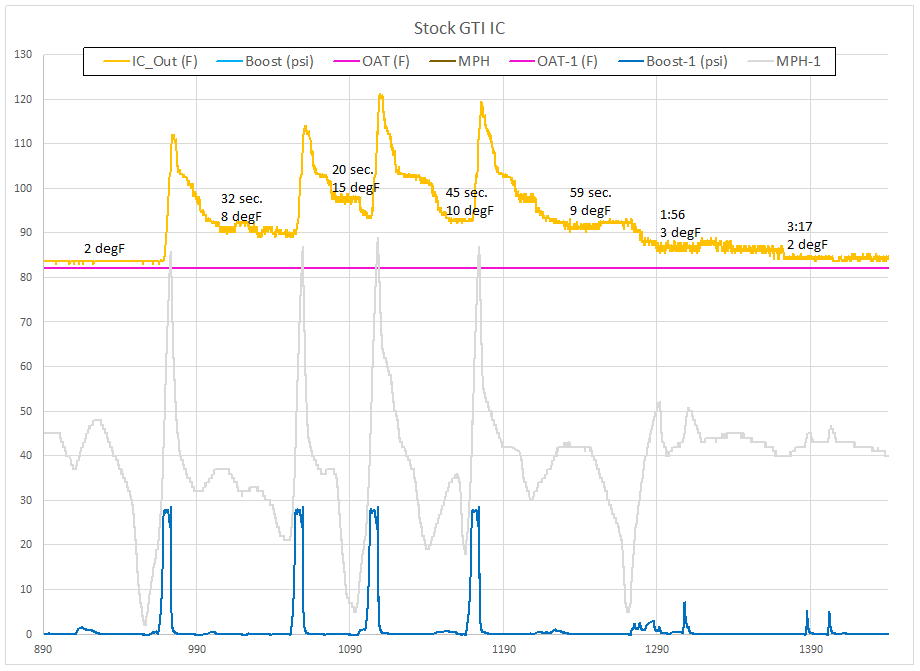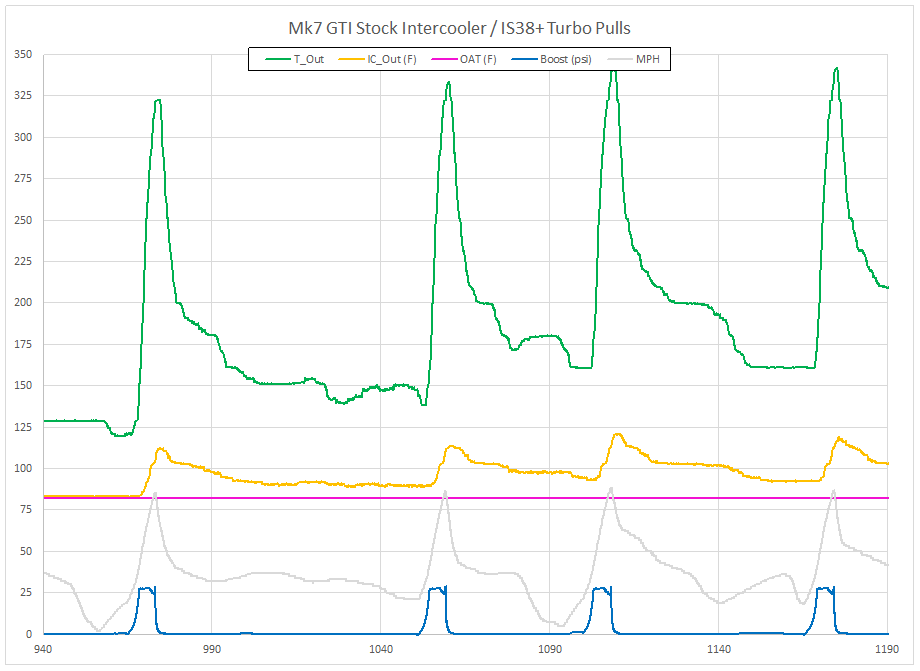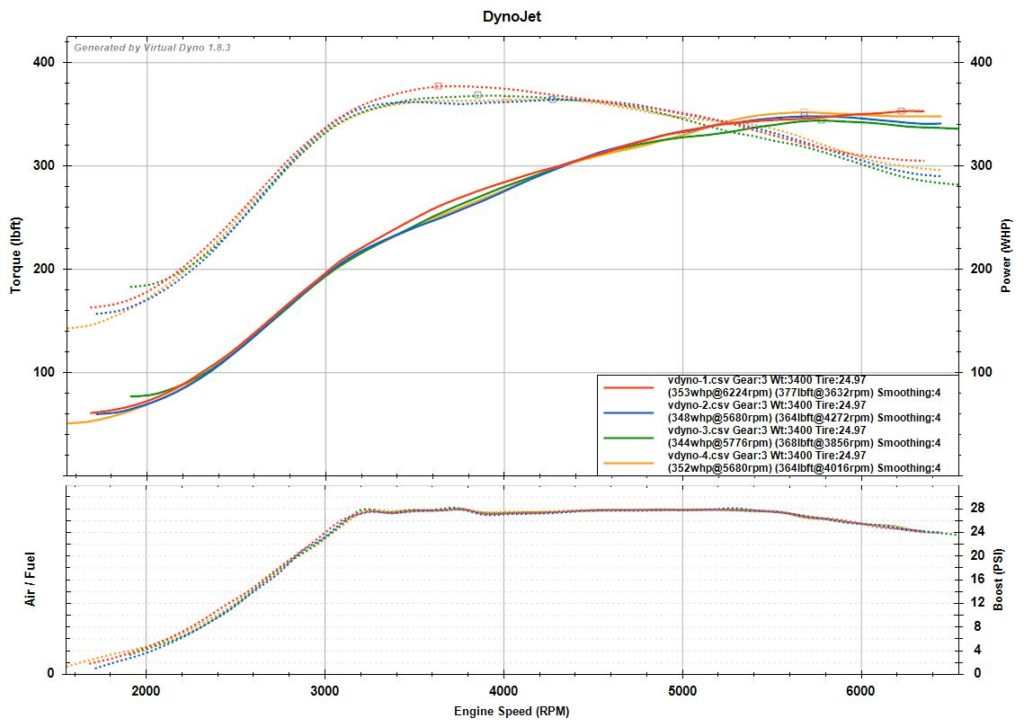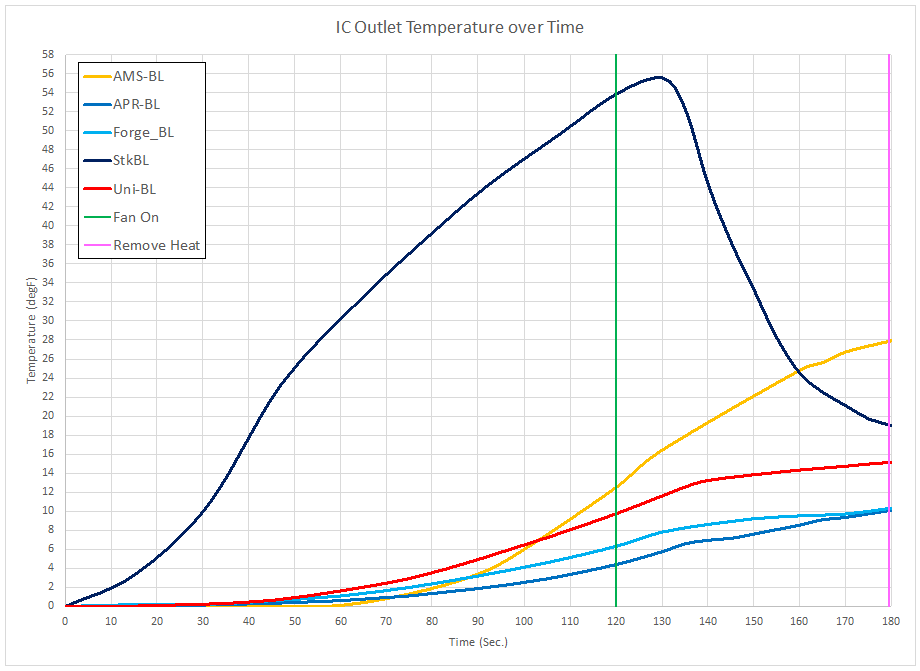Background:
I come across this opinion regularly; “the stock intercooler sucks, you get one pull and then it heat soaks“.
While the stock GTI intercooler doesn’t perform as well as some aftermarket options, it still performs quite well.
Intercooler data:
The chart below shows the IS38+ turbocharger outlet air temperature compared with the stock GTI intercooler outlet temperature and the outside air temperature:
With the information shown on the chart the intercooler efficiency can be calculated.
Note: IC efficiency is how much of a temperature drop the IC creates compared to the maximum that it could possibly drop. A maximum drop would be to ambient (OAT).
For reference, the Bell Intercooler FAQ calls out 90% as excellent efficiency for an air-to-air intercooler. This discussion about an aftermarket IC for the BMW N54 engine shows the aftermarket IC achieving 80-90% efficiency.
Pulling data from the chart, the turbocharger outlet temperature peaks between 325 and 350 degF. The highest intercooler outlet temperature reaches 121 degF and the outside air temperate is 82 degF. This results in a calculated efficiency of 84%.
Another knock against the stock intercooler is that it heat soaks after one pull. This is more difficult to evaluate since repeatedly generating high boost pressure involves the vehicle spending a significant amount of time at high speeds. A closed road course would be ideal for evaluating this, but that is not an environment my GTI encounters.
Revisiting the chart from above this shows a sequence of pulls with a short recovery period between the pulls.
Added to this chart is the intercooler outlet temperature above ambient at several times following a temperature peak. After the temperature peak the vehicle slows to below 40 mph for the temperature recovery.
How the vehicle is intended to be driven would factor into whether this recovery is adequate or not. Roughly 30-60 seconds is sufficient for the outlet air temperature to approach 8-10 degF above the outside air temperature.
The next chart uses the acceleration data from the pulls in the chart above and along with the Virtual Dyno software estimates the horsepower and torque during each pull:
Power and torque numbers by pull are:
- 353 hp / 377 ft-lbs
- 348 hp / 364 ft-lbs
- 344 hp / 368 ft-lbs
- 352 hp / 364 ft-lbs
Bench testing:
The affect that the stock IC low mass has on the performance as a heat sink is clear on the bench test. The stock IC heats very rapidly with no cooling air compared to several aftermarket intercoolers.
The stock IC does drop temperature much faster than the aftermarket intercoolers once the fan is turned on. Part of this rapid drop is a result of the large temperature delta the IC has with the cooling air, more heat will be pulled from the IC when the temperature differential is greater.
What is interesting from this chart is that before 60 seconds of fan cooling have elapsed the Stock IC outlet air temperature has dropped below the AMS intercooler and is approaching the Unitronic intercooler.
Conclusions:
The stock GTI intercooler showed an efficiency of approximately 84% during a series of pulls using an IS38+ turbocharger. Based on criteria published by Bell Intercoolers this performance is good for an air-to-air intercooler.
The stock GTI intercooler required 30-60 seconds to recover within 8-10 degF of ambient during a series of pulls with a short cooling period in between pulls. How the GTI is operated would strongly factor in determining if this is adequate or not.





Thanks Jeff. Your observations on your second chart (which appears in earlier posts) is helpful, as the stock behavior is so different.
As you highlight, the stock intercooler cools down so quickly when you turn a fan on it. I.wonder if a front mounted fan would be an effective mod for the stock intercooler. It may be cheaper, lighter and easier install than an IC upgrade.
I suspect the issue with the IAT rising during a pull would still exist. I believe the IC is functioning like a heat sink during a pull and the low mass of the stock IC would continue to be an issue.
To me, your recovery graph shows the issue I think many folks take issue with w/r to the stock IC and what they refer to as “heat soaking” – that successive runs create higher and higher deltas IAT to ambient with each additional pull. I hypothesize that if your 4th pull was not as long after the third (say 20 sec vs. 45) you would have seen even higher peak IATs afterward. IAT-abmient seems to be 30-40 deg which is a quite a bit higher than the typical 10-15 you get with the aftermarket units. Great testing again Jeff!
Yes the stock IC does heat up more than an aftermarket IC. Looking at the problem from the perspective of how much cooling any of these ICs do, dropping the air from 350’ish degrees to 10-30 over ambient is doing a good job.
Agreed – your data is a good reminder that the stock IC actually does work well but an aftermarket one is a better choice if you can float one. The R IC is slightly larger than the Golf/GTI one but I can’t imagine it does a whole lot better.
How you drive factors in as well. If the only time you are full throttle is merging, passing, etc. and not repeatedly, there’s minimal benefit to be gained with an aftermarket IC.
Hello Jeff, I appreciate you for giving us all of this knowledge about this. I have a question. do you think my engine would wear over time if i were to stick with stock intercooler with stage 1+ from unironic being in Florida? im a daily driver that does some pulls.
You’re welcome!
I don’t there is going to be an issue with your engine, the stock intercooler performs well, it’s in the 80% efficiency range which is quite good.